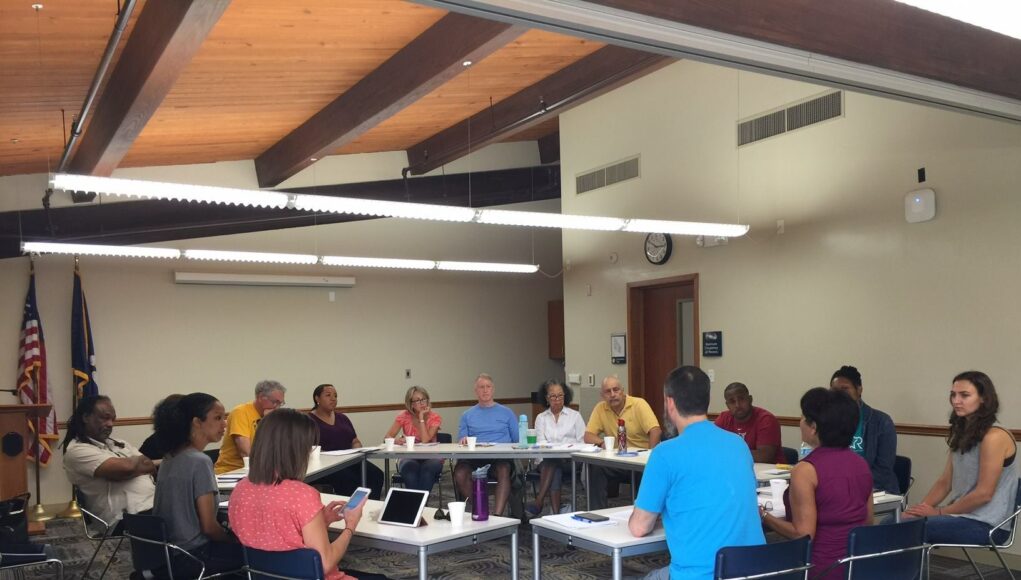Written with Crystalyn Whitaker
The YWCA of Northwest Louisiana (YWCANWLA) is preparing to launch the fourth session of it’s “Dialogue on Race” program and the timing could not be more opportune. Currently, the media is saturated with racial injustice, causing even the most blinded man and woman to see the grim reality we have cultivated in our great nation. The instances we’ve been inundated with are not at all new. The exposure, however, is. Then, all you have to do is mistakenly scroll into the comments section on a Facebook post of these events to see that there is no end in sight. For this reason, organizations are stepping up to eradicate racism through the only mean strong enough to do so: Education.
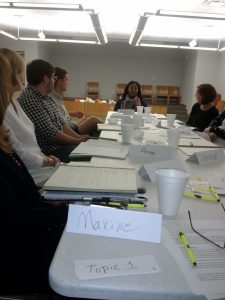 Developed over 20 years ago by the YWCA of Baton Rouge, the program expanded under the leadership of Maxine Crump, and is now replicated in multiple locations, including Shreveport and Fort Worth. The program is comprised of two session types: the basic or “original” session, which has been offered three times in Shreveport, as well as an advanced session, which is available to graduates of the original session and has been offered once. 22 community members in northwest Louisiana have already completed the basic program. Locally, the program is facilitated by two past participants, Henry Bernstein, a white male, and Danielle Brown, a black female.
Developed over 20 years ago by the YWCA of Baton Rouge, the program expanded under the leadership of Maxine Crump, and is now replicated in multiple locations, including Shreveport and Fort Worth. The program is comprised of two session types: the basic or “original” session, which has been offered three times in Shreveport, as well as an advanced session, which is available to graduates of the original session and has been offered once. 22 community members in northwest Louisiana have already completed the basic program. Locally, the program is facilitated by two past participants, Henry Bernstein, a white male, and Danielle Brown, a black female.
The six-week conversation follows an established curriculum, with each week emphasizing a different topic and conversations being supplemented by assigned readings. Participants are encouraged to share personal stories in a confidential environment, with a pronounced focus on issues related to institutional racism. According to Rachel Scott, Board President of YWCANWLA, the dialogue format helps “change individual thinking in the broader context of society.” The program encourages participants to think of existing social structures and the myriad ways racism works within those establishments. Topics include, but are not limited to, invisibility, privilege, affirmative action, the criminal justice system, education, housing, and healthcare.
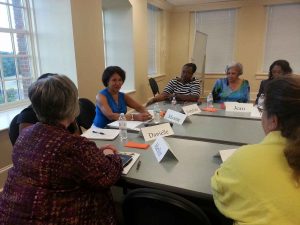 Speaking about her experience in the program, Ms. Scott noted that the sessions seemed to have a profound impact on white people, likely due to the honest dialogue between people with differing perspectives and experiences. She feels that the program cultivates a sense of safety, trust, honesty, adding that this combination can be very liberating. During the program, facilitators discuss the fact that there is no biological basis for race, and that these arbitrary divisions are merely social constructs. According to Scott, “Because we created this, we can change it, too.” This sentiment serves as a jumping off point for future growth. At the conclusion of the series, participants are encouraged to consider how they can use their experiences to change their community for the better, with personal growth measured by the administration of a pre- and post-test evaluating racial awareness.
Speaking about her experience in the program, Ms. Scott noted that the sessions seemed to have a profound impact on white people, likely due to the honest dialogue between people with differing perspectives and experiences. She feels that the program cultivates a sense of safety, trust, honesty, adding that this combination can be very liberating. During the program, facilitators discuss the fact that there is no biological basis for race, and that these arbitrary divisions are merely social constructs. According to Scott, “Because we created this, we can change it, too.” This sentiment serves as a jumping off point for future growth. At the conclusion of the series, participants are encouraged to consider how they can use their experiences to change their community for the better, with personal growth measured by the administration of a pre- and post-test evaluating racial awareness.
Jennifer Russell, another past participant, added, “The Dialogue On Race basic and advanced series have completely revolutionized the way that I view race and race relations in the United States, and encouraged me towards action to challenge the institutional structures which maintain racism. . . .The series has encouraged me as an individual to find ways to be not just a non-racist, but to take actions that are anti-racism. It helped clarify the inadequacy of being “colorblind,” and the need to understand an accurate history of race relations in our country. I am hopeful that the series can contribute to a longer-lasting dialogue in our community on how white persons and persons of color can come together to combat racism and its effects.” It is this intersectionality of racism with other forms of oppression and discrimination lends an additional layer of richness to the conversations. Participants who may not have experienced racism directly are able to find connections with their experiences of sexism, ageism, ableism, and homophobia to develop empathy for others.
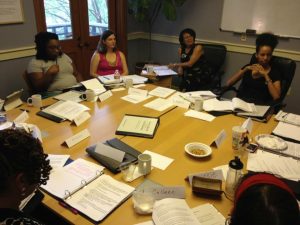 Think it not that racism is always news worthy. Also, think not that a person must be a “racist” in order to be, well, racist. There are traces of racial inequality in nearly every fiber of our society. For this reason, it will take everyone in this society to fix it. You cannot establish a nation with racial enslavement and expect there to be no effects thereof merely a century and a half later, especially when there was never restitution or reparation. Not to mention the decades that followed of Jim Crow, segregation, and disenfranchisement.
Think it not that racism is always news worthy. Also, think not that a person must be a “racist” in order to be, well, racist. There are traces of racial inequality in nearly every fiber of our society. For this reason, it will take everyone in this society to fix it. You cannot establish a nation with racial enslavement and expect there to be no effects thereof merely a century and a half later, especially when there was never restitution or reparation. Not to mention the decades that followed of Jim Crow, segregation, and disenfranchisement.
This is not a “one answer,” finite issue. There are many layers to this problem.
This type of program is needed in our area because we are guilty of the racial divide and often don’t realize it. It is masked in tradition and hidden in the subconscious. Our rhetoric. Our reactions when we see people of other races in public. The unsaid expectations we have of people of different races. The glass ceilings made impenetrable by those in charge. It does not take violence to perpetuate racism.
With our politicians, officers, and businesses becoming more diverse, we’re much in need of this discussion. Having a black mayor does not soothe the festering inequity at our core. Conversation and understanding do that.
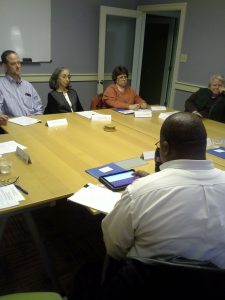 The mission of the YWCA is the elimination of racism, empowerment of women, and promotion of peace, justice, freedom and dignity for all people, achieving these objectives through their local initiatives for racial justice and economic empowerment. In 2010, the YWCANWLA temporarily closed to undergo a restructuring, including needs assessments and strategic planning, initiating services again in 2015. In May 2016, the YWCANWLA established their new Women’s Resource Center, located at 850 Olive Street, and is open Monday through Friday from 9:00am until 5:00pm (appointments are recommended). In addition to the Dialogue on Race, the YWCANWLA provides a number of other resources, including their Racial Justice Committee, which is open to anyone in the community, quarterly community forums, legal education services, crime victims assistance, support for homeless women, the LEAD teen empowerment program, and summer camp for teens.
The mission of the YWCA is the elimination of racism, empowerment of women, and promotion of peace, justice, freedom and dignity for all people, achieving these objectives through their local initiatives for racial justice and economic empowerment. In 2010, the YWCANWLA temporarily closed to undergo a restructuring, including needs assessments and strategic planning, initiating services again in 2015. In May 2016, the YWCANWLA established their new Women’s Resource Center, located at 850 Olive Street, and is open Monday through Friday from 9:00am until 5:00pm (appointments are recommended). In addition to the Dialogue on Race, the YWCANWLA provides a number of other resources, including their Racial Justice Committee, which is open to anyone in the community, quarterly community forums, legal education services, crime victims assistance, support for homeless women, the LEAD teen empowerment program, and summer camp for teens.
Registration for the Dialogue on Race is available via the YWCANWLA’s website. The cost is $25 per participant and scholarships are available for those experiencing economic barriers to participation. The next program will begin on Tuesday, August 2, 2016; the program is limited to 15 participants.. Applicants will be vetted to ensure a representative pool of participants, with specific attention being given to the balance of age, race, and gender of the group. Applications may be rolled over for future consideration in light of these diversity objectives. Participants are expected to attend all six of the scheduled meetings.

